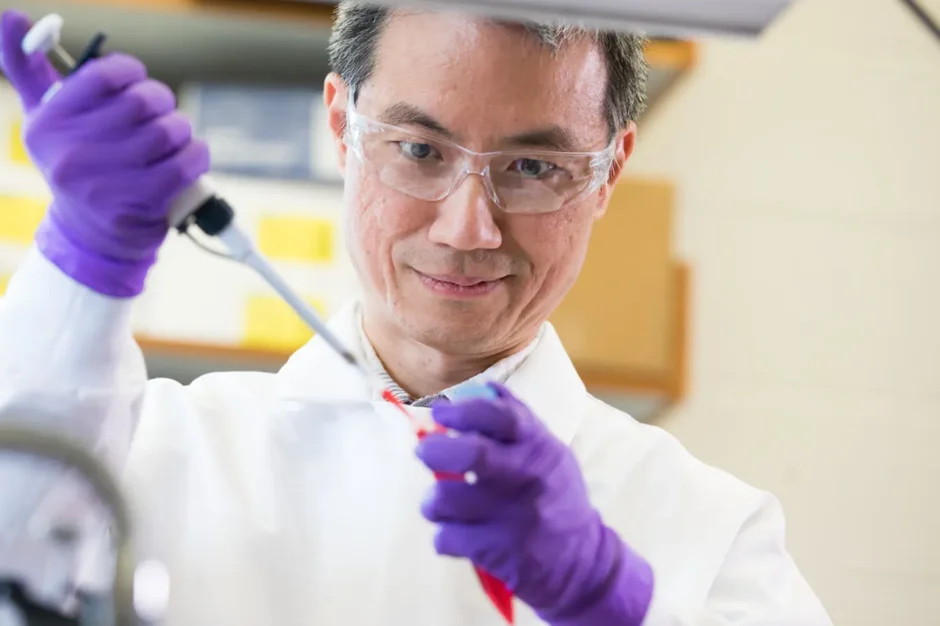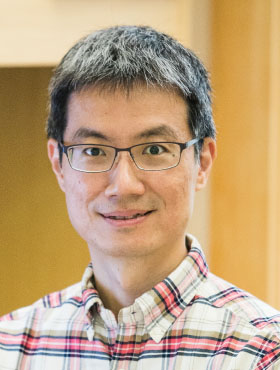Helping the immune system fight cancer
Research Highlight | December 13, 2021
Immune cells called T cells do a great job of killing and clearing away cancer cells – until they don’t. Like a good cop gone bad, T cells may stop policing cancer cells and become too exhausted to continue to function properly. This occurs due to the lack of glucose that they use for energy, sugar that is being scarfed up by the out-of-control tumor growth.
“Some tumors consume as much glucose as possible,” says Lucas Chang , an assistant professor at The Jackson Laboratory (JAX) in Bar Harbor, Maine, who studies the immune response to cancer. “This helps them grow fast, and it also disables the surrounding T cells by preventing them from deriving energy from these same resources.”
Many therapies used to treat cancer now, including PD-1 blockade treatment, target those errant T cells, working to enhance their ability to fight cancer cells, Chang explains. “However, there is much we do not know about this treatment. Because of this, there are many individuals for whom this therapy does not show any therapeutic effect over traditional cancer treatments. Our goal is to study the metabolism of these cells, in an effort to discover new ways to reinvigorate exhausted T cells to keep them doing their jobs.”
Genetically examining cancer
The V Foundation for Cancer Research has selected Chang as a 2021 V Scholar, and awarded him a two-year grant to support his investigations into how T cells respond to cancer cells during the progression of disease and treatment and how best to alter the metabolism of these cells to improve their ability to fight tumors.
Chang says, “There is currently a large gap between scientific discoveries in the laboratory and the patient’s bedside, which can be filled by increasing the collaboration between young scientists and physicians. Support from The V Foundation will greatly help me to bridge this gap and form new collaborations that will advance my research potential and pave the way to getting new discoveries to treat cancer.”
Chang joined JAX in 2017 following postdoc and research instructor posts at Washington University School of Medicine in St. Louis. Born and raised in Taiwan (his original first name is Chih-Hao), he obtained his bachelor’s degree in agricultural chemistry and M.Sc. in microbiology at the National Taiwan University, then moved to England to earn an M.Sc. in pharmacology and D.Phil. in clinical medicine at Oxford University.
“I enjoyed spending more than 20 years of my life on my hometown island with beautiful mountains,” Chang says. “Now I’m on another beautiful island with sand beaches and lobsters, working to conquer cancer.”
I see it as a personal mission to learn as much as I can about cancer. It is only through cancer research that those answers can be found.
Chang’s field of study recently became personal, when his closest cousin and his mother-in-law succumbed to cancer. “After seeing the extensive treatment plans, aggressive surgeries, and experienced the pain of loved ones, I see it as a personal mission to learn as much as I can about cancer. It is only through cancer research that those answers can be found.”
Although new therapies are constantly developed with improved patient outcomes, he adds, “the disease often recurs. This is what drives my passion for cancer research.”
The V Foundation for Cancer Research was founded by ESPN and the late basketball coach Jim Valvano. Since 1993, it has awarded more than $290 million in research grants. Chang’s is the latest of multiple V Scholar awards to JAX cancer researchers. Assistant Professor Olga Anczuków was a 2018 recipient for her work to characterize RNA splicing misregulation in breast tissues, with the goal of finding unique biomarkers for breast cancer development. A 2017 V Scholar awardee, Assistant Professor Ewelina Bolcun-Filas , investigates ways to prevent infertility in young female cancer patients caused by cancer-treating radiation. And in 2016, the Foundation recognized Associate Professor Jennifer Trowbridge , who studies aging stem cells that develop cancer cells instead of normal blood cells.
To Chang and all his laboratory members, the V Foundation’s motto of “Victory over cancer” means “a world where individuals are not concerned about losing a loved one to cancer. It means that research has progressed to the point where we understand the weaknesses in the progression of cancer and have learned to exploit them for the benefit of the human race.”




